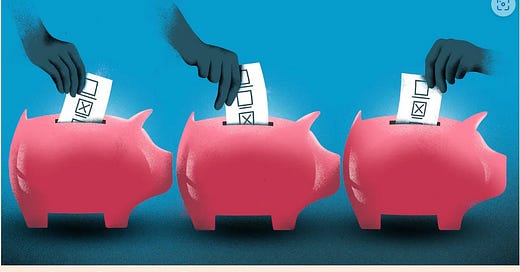Politics as Supermarkets:
How Micro-Interest Shopping Is Fading the Vision for Our Collective Future
Call it nostalgia. Or conservatism. But perhaps political predictability in much of the last century was not so bad after all. Elections were predictable in that in many countries (depending on the institutional setup), the same large parties changed seats or, in the Netherlands, the same three or four parties repeatedly shared power. This resulted in a moderately left or right course, with the collective long-term interest naturally incorporated into policy.
Nowadays, everything is different. Many parties and much uncertainty about post-election policies. This is the case in almost all countries where there are elections. In this case, the Dutch elections next week. And the effect is the same: voters behave like clients in a supermarket, maximising what they can buy for instant joy.
Election themes
It becomes all the more important to choose carefully. Extensive research has been conducted to determine what voters find important: housing, healthcare, migration, and the almost inevitable existential security usually top the list. Indeed, crucial. Additionally, there is a maze of voting guides, increasingly focusing on subthemes such as sustainability and technology. What stands out is that these are the problems directly affecting the prosperity of citizens at the moment. And that is actually strange. As numerous other lists indicate, the problem in the Netherlands is not so much prosperity at the moment. The Dutch are, on average, rich per person compared to other countries and well on happiness. The real big problems are for the long term. So, the score on the Sustainable Development Index is lower, and the Ecological footprint is almost 4 earths (which indicates that if all people on the Earth would live as the Dutch, we need four Earths). The largest problems are climate change, nitrogen crisis, water quality, but also innovation capacity and education.
Why do citizens mainly consider what concerns them here and now?
Micro versus Macro
After decades of market competition and individualism, we are conditioned to the idea that what is good for the individual is also good for the collective. A logical train of thought and economists have also taught it: the sum of micro is macro. The idea is that if we aggregate individual preferences, we almost automatically get what is important for society if we do that in the right way. To be clear, if policies can correct ‘externalities’ like carbon emissions and we set the right prices, this will be optimal. However, this reasoning is too simple and opposite to what cultural-evolutionary research shows: solely pursuing self-interest, even corrected for externalities, undermines the collective interest. We have seen this in recent years. Pursuing short-term interests such as more purchasing power or even existential security alone is not sustainable in the long run.
Group interest is fundamentally different from individual interest. It does simply not enter the individual utility function. It goes beyond altruism and cooperation but includes everything that enables a group to function. It is about sacrificing rather than exchanging and trading. This pro-social behaviour has made humanity successful, but it only works if we also feel like group members and accept the limitations that such a group imposes. And (also) there is a lack of it: the traditional pillars have disappeared, groups have mainly become coalitions uniting around partial interests. Away with the general interest, and micro is increasingly less macro.
Consequently, politicians no longer dare say something is not allowed or possible. It's logical because if voters only look for what they can gain, they are not waiting for a party that says they must sacrifice something for the common good. And there are more than enough parties that mainly represent partial interests, telling you they will ensure you are doing well. An analysis of election programs, a typical Dutch tradition, does not help in an election debate when all issues are dismissed as exchangeable, and sacrifice for the collective in the longer term disappears from view. Furthermore, some big parties in the polls refused to do the exercise for the first time in decades. But if you look at the election programs, they prefer more purchasing power than investing in fundamental research. They prefer building more houses than nature conservation.
This situation in the Netherlands is exemplary for most Western countries. Almost no politician dares to tell voters they can not have it all. Representative democracy has turned into a collection of supermarkets, where voters are clients who shop in different supermarkets from political parties. Politicians are nothing more than supermarket managers who try to let their clients buy as much as possible. They only differ regarding their product range on the shelves (some more organic, others more fast food).
Rediscovering the collective interest fundamentally differs from blindly representing partial interests or trying to satisfy voters about the here and now. But to achieve that, something is needed that has already been overshadowed in the political competition: presenting voters with a vision, making it clear that we all sometimes have to give up to ensure that the Dutch also have a good future. The eager political arena offers little room for that. If we want that, we must ensure that not all partial interests are represented in small parties or that the collective interest is once again broadly safeguarded. Collective values are more than a sum of individual desires. It would be nice if voters were aware of that. In the Netherlands, it is time to consider that on November 22.
Published in Het Financieele Dagblad, 10 November 2023



